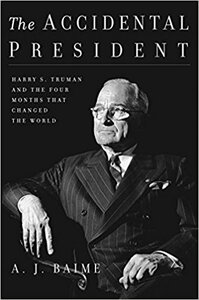Take a photo of a barcode or cover
99 reviews for:
The Accidental President: Harry S. Truman and the Four Months That Changed the World
A.J. Baime
99 reviews for:
The Accidental President: Harry S. Truman and the Four Months That Changed the World
A.J. Baime
4.5 stars
This was a very enjoyable read that kept me eagerly turning the pages even though the history itself held few surprises. It begins on April 12, 1945, with the death of Franklin D. Roosevelt and the succession of Harry S. Truman to the Presidency of the United States--the day "the whole weight of the moon and the stars fell on me," as Truman himself put it. It then flashes back to briefly describe Truman's life and surprising political rise before returning to 1945. The rest of the book is the story of the first four months of Truman's presidency, which included the end of World War II, the negotiations with Churchill and Stalin over the future of Europe, and the decision to drop the atomic bomb on Japan.
Chosen as Roosevelt's fourth-term running mate mostly because he was unobjectionable to a wide range of voters, Truman ended up being thrown into the presidential driver's seat during a maelstrom of war and political conflict. Despite his qualms, he rose beautifully to the occasion. I found myself very impressed with Truman's decisiveness, humanity, humility, and the way he dealt with people. The decision to use the atomic bomb will always be controversial--I have visited the museums in Hiroshima and Nagasaki about the bombings, and they are both horrific and heartbreaking. As Truman intended, the A-bombs did bring the war to a speedy close, preventing untold numbers of Allied casualties, but at the cost of thousands of innocent Japanese lives.
It reminds me of a scene in one of my favorite movies, The English Patient, in which Caravaggio holds up his mutilated hands and says to Almasy, "There was a result to what you did. It wasn't just another expedition. It did this. If the British hadn't unearthed that photographer [a German spy who got into British headquarters with the help of Almasy's maps], thousands of people could have died." And Almasy responds, "Thousands of people did die, just different people."
There is no simple answer to whether the use of the A-bomb was morally right or wrong, but this book makes clear how and why Truman made the difficult choice, and how able a successor to Roosevelt he ended up being. Not only was Truman a much more effective decision-maker than people at the time anticipated, he also comes across as a much nicer person, and in many ways an easier person to work for, than FDR, who, for all his great New Deal policies and magnificent leadership during the war, was a bit of an elitist, rarely gave straight answers in press conferences, and apparently turned many meetings into long discourses with no resolution. In contrast, Truman was relatable, efficient, and gave clear instructions. He had flaws, of course, but overall, this book left me impressed and wanting to read more about this "accidental president."
This was a very enjoyable read that kept me eagerly turning the pages even though the history itself held few surprises. It begins on April 12, 1945, with the death of Franklin D. Roosevelt and the succession of Harry S. Truman to the Presidency of the United States--the day "the whole weight of the moon and the stars fell on me," as Truman himself put it. It then flashes back to briefly describe Truman's life and surprising political rise before returning to 1945. The rest of the book is the story of the first four months of Truman's presidency, which included the end of World War II, the negotiations with Churchill and Stalin over the future of Europe, and the decision to drop the atomic bomb on Japan.
Chosen as Roosevelt's fourth-term running mate mostly because he was unobjectionable to a wide range of voters, Truman ended up being thrown into the presidential driver's seat during a maelstrom of war and political conflict. Despite his qualms, he rose beautifully to the occasion. I found myself very impressed with Truman's decisiveness, humanity, humility, and the way he dealt with people. The decision to use the atomic bomb will always be controversial--I have visited the museums in Hiroshima and Nagasaki about the bombings, and they are both horrific and heartbreaking. As Truman intended, the A-bombs did bring the war to a speedy close, preventing untold numbers of Allied casualties, but at the cost of thousands of innocent Japanese lives.
It reminds me of a scene in one of my favorite movies, The English Patient, in which Caravaggio holds up his mutilated hands and says to Almasy, "There was a result to what you did. It wasn't just another expedition. It did this. If the British hadn't unearthed that photographer [a German spy who got into British headquarters with the help of Almasy's maps], thousands of people could have died." And Almasy responds, "Thousands of people did die, just different people."
There is no simple answer to whether the use of the A-bomb was morally right or wrong, but this book makes clear how and why Truman made the difficult choice, and how able a successor to Roosevelt he ended up being. Not only was Truman a much more effective decision-maker than people at the time anticipated, he also comes across as a much nicer person, and in many ways an easier person to work for, than FDR, who, for all his great New Deal policies and magnificent leadership during the war, was a bit of an elitist, rarely gave straight answers in press conferences, and apparently turned many meetings into long discourses with no resolution. In contrast, Truman was relatable, efficient, and gave clear instructions. He had flaws, of course, but overall, this book left me impressed and wanting to read more about this "accidental president."
I enjoyed reading this book, which surprised me. I suppose because it was steeped in war and foreign policy, but I found it also showed the humility of a man that rose to great power. That was he ordinary I find is part of his charm. There were so many events that took place in the first four months of Truman's Presidency, it's a wonder he was able to maintain such composure and determination. This was a very interesting read.
A lesson
Regardless of how one feels about the use of the atom bomb, this book shows what happens when a failed businessman rises unexpectedly to the highest office in the land. All it takes is humility and integrity.
Regardless of how one feels about the use of the atom bomb, this book shows what happens when a failed businessman rises unexpectedly to the highest office in the land. All it takes is humility and integrity.
Well researched and very readable nonfiction. It is understandable why Truman wins praise from historians for his crisis leadership.
Incredibly well-researched and well-written. I haven't been an avid reader of historical non-fiction, but this book was a page-turner and is prompting me to read more of this genre and by this author.
challenging
medium-paced
challenging
dark
informative
inspiring
reflective
fast-paced
emotional
funny
informative
inspiring
reflective
medium-paced
Moderate: Genocide, Fire/Fire injury, War
slow-paced
medium-paced



